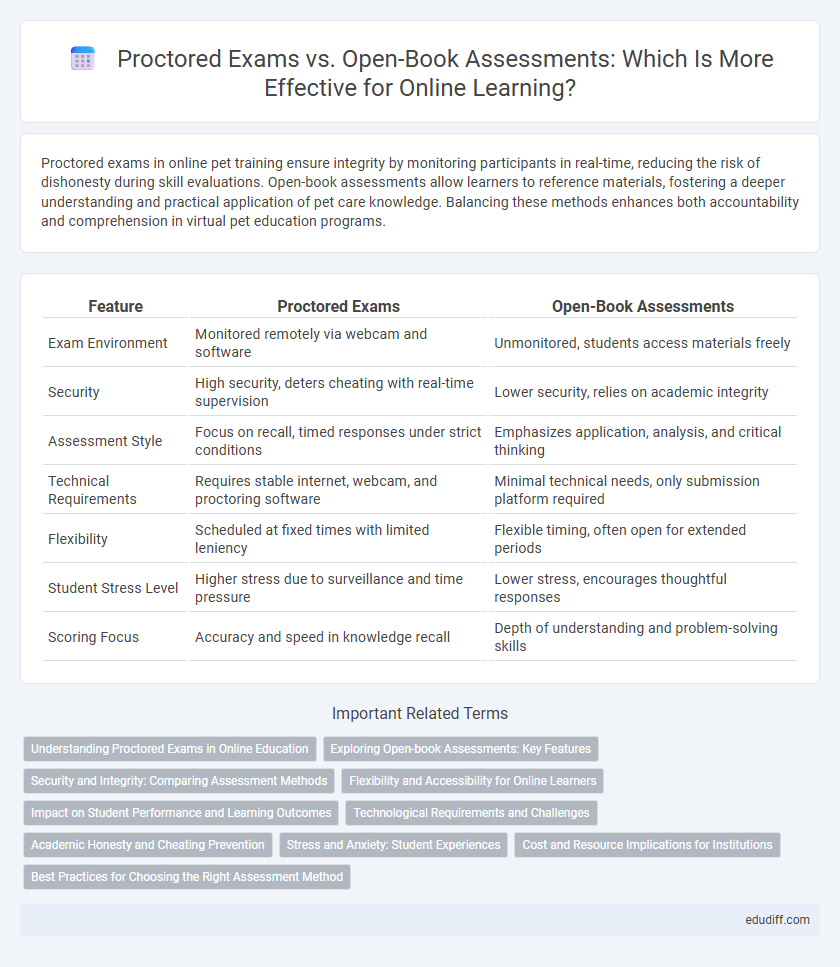Proctored exams in online pet training ensure integrity by monitoring participants in real-time, reducing the risk of dishonesty during skill evaluations. Open-book assessments allow learners to reference materials, fostering a deeper understanding and practical application of pet care knowledge. Balancing these methods enhances both accountability and comprehension in virtual pet education programs.
Table of Comparison
| Feature | Proctored Exams | Open-Book Assessments |
|---|---|---|
| Exam Environment | Monitored remotely via webcam and software | Unmonitored, students access materials freely |
| Security | High security, deters cheating with real-time supervision | Lower security, relies on academic integrity |
| Assessment Style | Focus on recall, timed responses under strict conditions | Emphasizes application, analysis, and critical thinking |
| Technical Requirements | Requires stable internet, webcam, and proctoring software | Minimal technical needs, only submission platform required |
| Flexibility | Scheduled at fixed times with limited leniency | Flexible timing, often open for extended periods |
| Student Stress Level | Higher stress due to surveillance and time pressure | Lower stress, encourages thoughtful responses |
| Scoring Focus | Accuracy and speed in knowledge recall | Depth of understanding and problem-solving skills |
Understanding Proctored Exams in Online Education
Proctored exams in online education provide a secure testing environment by remotely monitoring students through webcam and screen-sharing technology to prevent academic dishonesty. These exams enforce strict time limits and require identity verification, ensuring that the assessment reflects the student's individual knowledge and skills. Understanding proctored exams highlights their role in maintaining academic integrity compared to open-book assessments, which allow access to resources during the test.
Exploring Open-book Assessments: Key Features
Open-book assessments allow students to access textbooks, notes, and online resources during exams, promoting critical thinking and application of knowledge rather than memorization. These assessments typically emphasize problem-solving, analysis, and synthesis of information, aligning closely with real-world scenarios. Enhanced by digital platforms, open-book exams offer flexibility and reduce anxiety by enabling a more authentic demonstration of student learning.
Security and Integrity: Comparing Assessment Methods
Proctored exams enhance security by using real-time monitoring and AI-based behavior analysis to prevent cheating, ensuring the integrity of the assessment process. Open-book assessments prioritize application and critical thinking but face challenges in maintaining academic honesty without strict supervision. Advanced authentication technologies and randomized question banks are essential to uphold integrity across both online assessment methods.
Flexibility and Accessibility for Online Learners
Proctored exams ensure exam integrity but often limit flexibility due to strict scheduling and technical requirements, which can create accessibility barriers for diverse online learners. Open-book assessments provide greater flexibility by allowing students to complete exams at their own pace and location, accommodating varying time zones and learning environments. This accessibility supports a wider range of learners, promoting inclusivity and reducing stress associated with rigid exam conditions.
Impact on Student Performance and Learning Outcomes
Proctored exams enhance academic integrity by minimizing cheating, fostering accurate assessments of student knowledge and improving reliability in measuring learning outcomes. Open-book assessments encourage critical thinking and application of concepts, promoting deeper understanding and retention but may risk reduced exam rigor if not well-designed. Balancing these methods optimizes student performance by combining authentic evaluation with opportunities for conceptual learning and problem-solving skills development.
Technological Requirements and Challenges
Proctored exams demand advanced surveillance technologies such as AI-powered cameras, secure browsers, and real-time monitoring systems to ensure academic integrity, posing significant bandwidth and privacy concerns for test-takers. Open-book assessments require robust digital platforms that support resource access and collaboration but face challenges in preventing unauthorized information sharing and ensuring equitable technology access. Both formats necessitate seamless integration of secure software and reliable internet connectivity to balance exam security with user experience.
Academic Honesty and Cheating Prevention
Proctored exams utilize live or AI monitoring technologies to uphold academic honesty by deterring cheating through real-time supervision and identity verification. Open-book assessments, while promoting critical thinking and application of knowledge, rely heavily on carefully designed questions and plagiarism detection tools to maintain integrity. Both formats demand robust security measures to effectively prevent academic dishonesty in online learning environments.
Stress and Anxiety: Student Experiences
Proctored exams often escalate student stress and anxiety due to strict monitoring and the fear of technical issues or penalties, impacting performance negatively. Open-book assessments reduce pressure by allowing access to resources, which fosters a calmer environment and encourages critical thinking. Studies reveal that students report lower anxiety levels and improved focus during open-book formats compared to the high-tension conditions of proctored exams.
Cost and Resource Implications for Institutions
Proctored exams incur higher costs due to investments in specialized software, secure platforms, and personnel to monitor testing environments, increasing institutional overheads. Open-book assessments reduce expenses by eliminating the need for real-time supervision and enabling flexible scheduling with existing digital infrastructure. Resource allocation for proctored exams often demands dedicated IT support and training, whereas open-book formats leverage existing educational tools, optimizing institutional budgets.
Best Practices for Choosing the Right Assessment Method
Selecting the appropriate assessment method requires evaluating academic integrity, accessibility, and learning objectives. Proctored exams ensure strict supervision to minimize cheating, ideal for testing knowledge recall and application under timed conditions. Open-book assessments promote critical thinking and problem-solving by allowing resource consultation, suited for evaluating synthesis and analysis skills in less restrictive environments.
Proctored exams vs Open-book assessments Infographic

 edudiff.com
edudiff.com